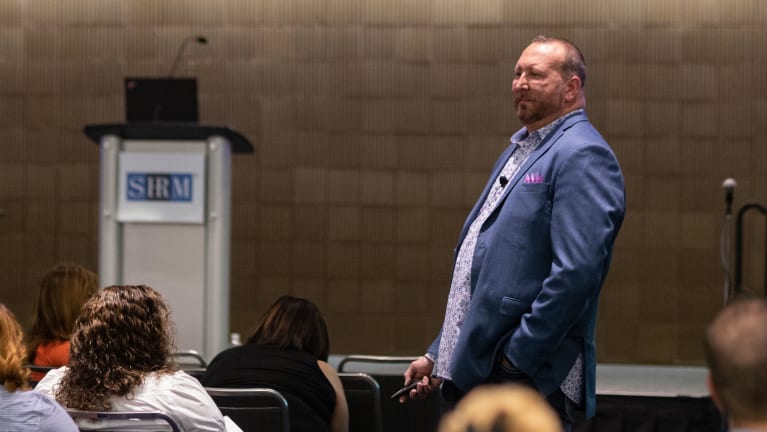

?The Great Recession has caused many workers to become increasingly particular about what they look for in an employer. As a result, companies have been scrambling to identify ways to recruit and retain talent.
But one way employers can improve these efforts: becoming more empathetic.
About 97 percent of workers believe empathy is an essential quality of a healthy workplace culture, and 92 percent said they specifically look for organizations that demonstrate empathy when seeking a job, according to a 2021 survey by the Society for Human Resource Management (SHRM).
On June 13, Jeremy York, SHRM-SCP, vice president of talent strategy success for HR consulting firm Purple Ink LLC in New Orleans, discussed this topic while leading a concurrent session, “Empathy: The New Work Culture Norm,” at the SHRM Annual Conference & Expo 2022 in New Orleans.
“Empathy is an investment in our people,” York said. “It creates a culture where people actually want to come to work. And they feel comfortable bringing their whole selves to work.”
Empathy is critical to leadership, he explained. It helps to build and sustain positive workplace relationships; foster diversity, equity and inclusion; encourage cooperation and collaboration; and facilitate conflict management.
Workers are tired of being treated as numbers rather than human beings, York said. In many instances, the dynamic between employer and employee is a one-way relationship: Leaders can demand their subordinates take on additional projects or work overtime, but when workers want time off for personal commitments, they must request it—and it may become an issue if rejected.
“I call the Great Resignation ‘the Great Awakening,’ ” York said. “People are starting to realize that if you don’t show empathy, employees are going to leave.”
How to Build Empathy
What role does empathy play in the workplace? And why does it matter?
Empathy is about understanding your workers, York said. It is a key part of emotional intelligence and effective leadership, and it can improve human interactions, leading to more effective communication and positive outcomes.
York offered six ways organizations can become more empathetic:
- Listen to your workers. Actively listen to hear the meaning behind what others are saying, pay attention to nonverbal cues, reflect the feelings expressed and summarize what you are hearing.
- Encourage genuine perspective-taking. Managers should consistently put themselves in the other person’s place. This can be applied to solving problems, managing conflict or driving innovation.
- Cultivate compassion. Verbal encouragement and motivation exemplify compassion. Communicate openly, express yourself clearly to others, and be aware of the emotions and thoughts of others—your words can make or ruin their day.
- Organize empathy training. Empathy skills can be taught, and one of the most effective ways to broaden adoption is to arrange for empathy training for your employees. You can look for a provider in your area and arrange a session.
- Tweak your hiring process. Do you look for empathy in job candidates? Be intentional about screening for empathy by drafting interview questions that encourage applicants to show how they practice empathy.
- Reward empathy. Acknowledge an employee when they exhibit empathy. You can do this by making a public announcement referencing how the employee displays strong empathy skills.
Body language is an integral pillar of empathy. For example, if a worker is explaining a work task or talking about an aspect of their home life, managers need to put away their phones, computers and other distractions. Attentiveness shows sincerity, York said.
It’s also important for companies to talk about empathy with their managers and workers. Let your workforce know that empathy matters and teach them that giving time and attention to others enhances job performance and improves effectiveness.
“This isn’t rocket science,” he said. “This is us treating people like people.”
Roadblocks to Empathy
Fawn Seifrit, HR manager for the Berkshire Country Club who travelled from Reading, Pa., to attend the conference, said acknowledging the challenges of empathy and “transitioning the focus away from ourselves and to the employees” was a big takeaway from York’s session.
“As HR professionals, we’re so worried about us being successful and what we need to be successful,” Seifrit said. “But in the process, we’re not fully showing empathy to the other person.”
Exhibiting empathy isn’t always easy. York outlined several roadblocks to achieving empathy, including:
- Feeling the pressure. When our brains are under pressure, we have a hard time distinguishing between our own emotional state and the emotional state of others.
- Emotions are contagious. When we become agitated, others are more likely to react to our agitation, with similar emotions.
- Snap decisions encourage projection. Making decisions under pressure also makes us less likely to accurately assess a situation, and we begin to project our own emotions onto others.
- Defensiveness is self-protection. It is easy to start taking things personally when we must empathize with someone who is suffering.
- The “stranger effect.” It is easier to empathize with people we already know.
York explained that the stranger effect is of particular importance because people are conditioned to interact with people with whom they share similar interests.
“But If we learn to be around and comfortable with people from different backgrounds, that can help us be more comfortable with different people, build relationships and develop trust,” York said, noting that embracing people of different cultures can also improve recruitment and retention efforts.
He also said empathy is not an excuse for poor job performance. Companies can show empathy and still hold employees accountable for their work. For example, managers can suggest remote-working options if the worker is having trouble securing child care, while still holding the worker accountable for completing projects and attending meetings virtually.
“Many leaders today do not show empathy, but it’s important in today’s climate,” he said. “We don’t focus on empathy or people enough. That needs to change.”
